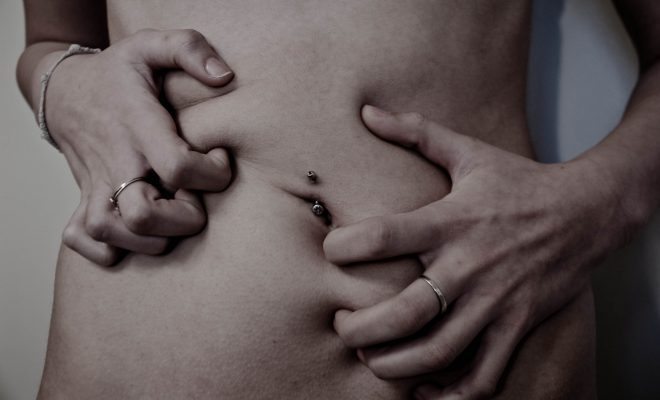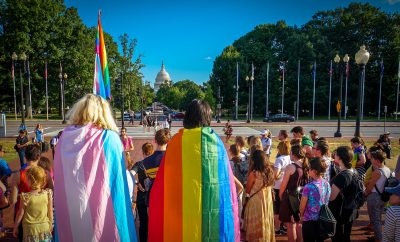
"grab" courtesy of [Christy Mckenna via Flickr]
Health & Science
Bones Are (Not) Better: The Battle to Ban Pro-Ana Websites
Childhood and adult obesity is highly reported as a growing epidemic in the United States, yet less often do we hear of the negative psychological and physical ramifications of eating disorders. According to the National Institute of Mental Health, anorexia nervosa is the most fatal mental disorder, “[with] an estimated mortality rate of around 10 percent.” According to the National Eating Disorder Association, “20 million women and 10 million men [in the United States] suffer from a clinically significant eating disorder at some time in their life.” Although these types of disorders may not always be obvious, they are taking a toll on many young Americans who suffer in silence until it is too late.
What is an eating disorder?
An eating disorder is a life consuming mental illness that forces an individual to consciously diet or consume to an extreme, detrimental point. People who are affected by an eating disorder constantly obsess over calories, food, and their body weight. In the case of anorexia, the person limits his or her calorie intake to an extremely low and unhealthy number and adheres to a strict diet only consisting of “safe” foods. An individual with bulimia binges until he or she is uncomfortably full, then purges by vomiting. These disorders cause serious physical and psychological damage and can ultimately result in death. They are fueled by personal angst, trauma, and are essentially a way to cope with negative feelings, including personality disorders such as Obsessive Compulsive and extreme perfectionist tendencies. Eating disorders go beyond the surface desire of wanting to be thin. If left untreated through cognitive therapy and support, eating disorders will progressively consume the victim, until his or her entire life revolves around appeasing this internally violent illness.
What is a Pro-Ana/Mia website?
A Pro-Ana/Mia website is a public forum on which people, the majority of whom are women, with eating disorders share tips for maintaining an anorexic or bulimic lifestyle. Members share diet, beauty, and fitness tips that revolve around the theme of being thin. Discussions are not all illogical, yet the majority of them are fueled by the intense desire to remain in control, with the ultimate goal of reaching the most emaciated state possible. The sites often feature photographs of extremely thin people whose bones protrude and bodies that appear sick and gaunt. According to Children’s Mercy Hospital and Clinics, “there are now over 400 pro-ana/mia websites.” These sites encourage people to embrace their disorders as a lifestyle and assure victims that they are not abnormal or alone in their choice to live with an eating disorder. They promote and enhance the typically negative image that eating disorders support. Woman offer each other support to fuel the disorder, continuously telling it that the body is not (and never will) be thin enough. According to the National Association of Anorexia Nervosa and Associated Disorders characteristics of a pro-ana site include:
- The glamorization/idolization of images of emaciated or very thin individuals
- The implication that food and weight are the enemy
- Encouragement and teaching of dangerous eating disorder behaviors
- Promotion of thinness at any cost, denial of the seriousness of the illness
- Insistence that eating disorders are choices rather than illnesses
- Attempts to mask toxicity by being exclusive and elite
What the investigative report below on the dangers of pro-anorexic (pro-ana) and pro-bulimia (pro-mia) websites.
Do Pro-Ana/Mia Websites constitute free speech?
Eating disorders continue to carry a negative connotation despite their increasing popularity among teens and young women. This doesn’t stop women from openly spilling their diet and exercise secrets, no matter how extreme and unhealthy. The pro-ana maxim is “thinspiration.” Girls motivate one another to maintain their eating disorders and are virtually assisting each other in a prolonged suicide.
This information is accessible to children. Girls mature faster than boys and are susceptible to the influence of their peers as early as the age of eight. If curiosity about weight loss becomes appealing, the individual has this controversial information right at her fingertips. Proponents of the movement feel that if these websites are not censored they will continue to corrupt youth and increase eating disorders among younger generations.
Watch the video below of four recovered women sharing the harm Pro-ana/mia websites can inflict on someone struggling with an eating disorder.
According to Article 19 of the International Covenant on Civil and Political Right, “[The right of freedom of expression may] be subject to certain restrictions…For the protection…of public order or of public health or morals.” Pro-Ana/Mia websites portray anorexia and bulimia in a positive light and increase the likelihood of individuals who view them developing an eating disorder. This could be considered a danger to the overall public health, and gives government the incentive to block or censor them.
Pro-Ana supporters argue that the “thinspiration” movement gives individuals the opportunity to gain support and share tips with others who are experiencing the same thing, yet all of the exchanges on these sites seem to be negative. People motivate one another by saying things like they need lose more weight, and giving them tips on how to achieve that dream state of being virtually weightless and emaciated. The sites lack any positive effect on the community or individuals suffering with an illness. Therefore, they have little to argue regarding their need to stay accessible to the general public or their effect on the community.
Case Study: Valerie Boyer’s Bill (Ban on Pro-Ana)
A short clip from the documentary about the pro-anorexia movement in France, and the legislation to make it illegal:
France passed legislation in 2008 outlawing the portrayal of extreme thinness in the media as a desirable or positive trait. Additionally, Valerie Boyer, a right-wing member of the lower house of Parliament, created a bill to enforce the elimination of Pro-Ana websites. The bill called for media outlets to face potential fines and possible jail time if they embraced the message that emaciation and eating disorders are attractive. The bill did not pass, yet it helped to draw more attention to the issue and awareness in both France and the United States has been increasing since the proposal. In the United States, servers such as Yahoo have worked to ban several pro-anorexia websites from their server.
Case Study: Social Media Bans Pro-Ana
In an effort to stop the glamorization of eating disorders throughout social media, Instagram, Pinterest, and Tumblr all updated their policies in 2012 to ban some of the attention that pro-ana websites receive online. Tumblr issued a statement outlining its plan to eliminate blogs that actively promote self-harm. If a user types in a trigger word such as “anorexia” on Tumblr, instead of receiving diet tips or images of emaciated models, a message urging you to seek assistance will appear. On Pinterest, although pro-anorexia images still exist upon searching “anorexia”, results are displayed below the following message:
“Eating disorders are not lifestyle choices, they are mental disorders that if left untreated can cause serious health problems or could even be life-threatening. For treatment referrals, information, and support, you can always contact the National Eating Disorders Association Helpline at 1-800-931-2237 or www.nationaleatingdisorders.org”
Although more passive in nature, this message is meant to urge the user to recognize the dangers of the disorder, and to seek professional support as oppose to the negative motivation from others who suffer from a similar illness.
Instagram issued a new policy, to eliminate the promotion of self-harm on Instagram. The policy reads:
“Don’t promote or glorify self-harm:
-
“While Instagram is a place where people can share their lives with others through photographs and videos, any account found encouraging or urging users to embrace anorexia, bulimia, or other eating disorders; or to cut, harm themselves, or commit suicide will result in a disabled account without warning. We believe that communication regarding these behaviors in order to create awareness, come together for support and to facilitate recovery is important, but that Instagram is not the place for active promotion or glorification of self-harm.”
Instagram does not follow through with its former ban. When searching “anorexia” on Instagram, results display a long list of users who share photos of their gaunt collarbones, protruding hips, and non-existent thighs. One photo, under the user “anorexianervosa_depression,” reads:
“Call it a sickness, call it an obsession, I don’t care, I call it perfection.”
There have been petitions to eliminate “thinspiration” tags on Twitter, yet when searched several photographs of overtly thin thighs and tiny waists appear. On Facebook, pages such as “Anorexia Tips” are easily accessible to anyone with an account. To see how websites measured up to their policy proposals, Buzzfeed compiled a list of all of social media sites efforts to ban pro-ana, and graded them based on how effectively they have eliminated the “thinspiration” movement across the web. Most of the sites received a low grade, in that most of them still permit much of the pro-anorexia community’s antics and do little to stop the community from continuing to infiltrate the social media stream.
Users have discovered loopholes. The bans do not necessarily stop users from continuing to post pro-ana material; in order to remain accessible, users can simply use different taglines in order for the material to appear when searched.The only way to truly minimize the value of the “thinspiration” movement is for people to stop liking the material, then it will eventually fade away.
Social media platforms run into some problems when they ban one type of body fad and not others, such as body building. Any extreme body manipulation could be considered a dangerous mental illness, therefore singling out a specific movement could cause the networks freedom of speech problems. To consider one group more dangerous than another becomes constitutionally complicated in that one group should not be favored over the other if they all do pose a potential threat to society. Eating disorders can be a very subjective experience and the line between the sharing of a personal experience and advocating for a disease is very thin. If pro-ana sites were to be censored or banned, would people who are simply telling their story be penalized?
The battle to remove these sites rages on between concerned medical experts and parents; yet pro-ana reigns on as a form of freedom of speech, and will continue to taint the minds of eating-disordered individuals until they are stopped.
Resources
Primary
DHS of Iowa: Pro-Anorexia/Pro-Bulimia Websites: A Dangerous Influence
Additional
ANAD: Eating Disorders and the Internet
About Kids Health: Starved for attention: pro-anorexia websites glorify eating disorders
CBS: Despite social media bans of “pro-ana” websites, pages persist
Huffington Post: Why Blocking ‘Pro-Ana’ Sites Is a Bad Idea
Johns Hopkins University: Study Examines Pro-Anorexia and Pro-Bulimia Websites
Eating Disorders Recovery Today: Call to Ban Pro-Ana Websites
The New York Times: Point, Shoot, Retouch and Label?
PBS: Fighting social media ‘thinspiration’ with messages of self-acceptance
ABC: Pro-Anorexia ‘Thinspiration’ Photos Shouldn’t Be Banned from Social Media
Huffington Post: Can Thinspiration Really Be #Banned From Instagram?
Debate: Should pro-anorexia websites be censored?
—
Madeleine Stern (@M3estern) is a student at George Mason University majoring in Journalism and minoring in Theater. Her writing on solitary confinement inspired her to pursue a graduate degree in clinical counseling after graduation. Madeleine is an avid runner, dedicated animal lover, and a children’s ballet instructor. Contact Madeleine at staff@LawStreetMedia.com.
Featured image courtesy of [Evelina Zachariou via Flickr]








Comments